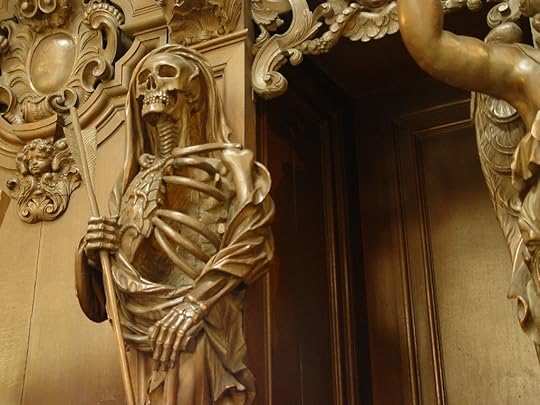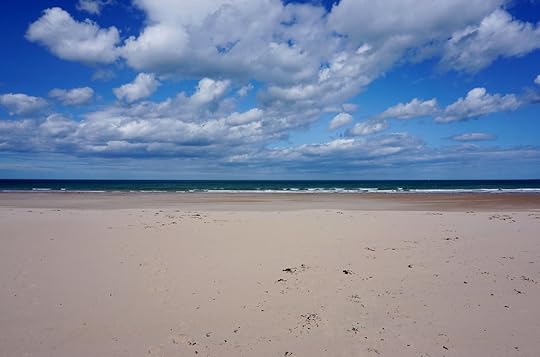Robin Helweg-Larsen's Blog, page 71
August 7, 2021
Sonnet: ‘Marion Campbell of Kilberry, 1919-2000’

In winter’s broken skies, in spring’s thin drizzle,
The gardens wall in sun to warm the ground,
Can still be worked: vegetables grow year-round.
Fingers are cold – but hearths will crackle, sizzle.
It’s drear – but through a week’s rain, and two fair
Days’ sun, daffodils flood the world with light.
Otters slide down rocks, lambs jump in delight,
Rooks tumble, jump and slide, in empty air…
You love their flight; but, grounded, here you stand.
The summer dry and hot, sea almost warm,
Unpeopled heather hills, long days, no storm.
And you, embodying castle and land:
Stone walls and floors, trophies and weaponed walls,
Books read, books written, haunting ancestral halls.
Marion Campbell was a truly remarkable archaeologist, author and cultural activist. Her enormous store of memory of history and lore blended with personal experience, together with her desire to share her knowledge through writing books and creating local museums, is summed up in a charming anecdote at the start of her obituary in The Herald:
Two days before her death, as she lay apparently unconscious in the hospital at Oban, I was telling someone in the same ward about a lost standing-stone at Ballymeanach and remarking that nobody knew when it had fallen. Suddenly a muffled voice from behind the oxygen mask said: ”Well, I know! It was in 1943, when a Shetland pony was sheltering against it from the storm. The poor beast was nearly scared to death.”
She was a cousin of my mother’s, and I was fortunate enough to spend weeks and months with her at Kilberry in my teens and 20s. This sonnet, written in fond tribute, was published in The Orchards Poetry Journal a couple of years ago.
August 3, 2021
Evocative Fragments: from Arnold’s ‘A Summer Night’ (2)

And the rest, a few,
Escape their prison and depart
On the wide ocean of life anew.
There the freed prisoner, where”er his heart
Listeth, will sail;
Nor doth he know how there prevail,
Despotic on that sea,
Trade-winds which cross it from eternity.
Awhile he holds some false way, undebarred
By thwarting signs, and braves
The freshening wind and blackening waves.
And then the tempest strikes him; and between
The lightning-bursts is seen
Only a driving wreck,
And the pale master on his spar-strewn deck
With anguished face and flying hair
Grasping the rudder hard,
Still bent to make some port he knows not where,
Still standing for some false, impossible shore.
And sterner comes the roar
Of sea and wind, and through the deepening gloom
Fainter and fainter wreck and helmsman loom,
And he too disappears, and comes no more.
This fragment is the response to the previous fragment from Matthew Arnold’s ‘A Summer Night’ that I blogged a few days ago. As a teen in a well-regimented boarding school I found that previous fragment terrifying with its prospect of living as a bored wage-slave forever, and this second fragment exhilarating in its freedom despite the expectation of catastrophe. Altogether a very subversive poem, and I thank my schooling for including such works. For the next couple of decades I followed its path, failing to earn a degree at universities in three countries, never holding a job for more than 18 months, frequently moving. Eventually I found an occupation that was constantly changing, where I was my own boss, and that took me to dozens of countries to teach business seminars. So it all worked out.
Arnold originally ended his poem:
Is there no life, but these alone?
Madman or slave must man be one?
but ten years later added a much more wishy-washy piece about learning from the pure heavens and seeing what a nice life you could make for yourself. I always thought he should have stopped with the original “madman or slave” view of life. Much more dramatic – even though I have to admit his addition may have been justified.
“Storm at Sea” by gentlemanbeggar is licensed under CC BY-NC-SA 2.0
August 2, 2021
Poem: ‘Liminal Vision’

Grid of Existence, seeming minimal–
unknown extent, intent–
all-ruling, always nearing, liminal–
imminent, eminent–
the great all-seeing Eye of all the world–
the oracular Oculus–
the Stick round which our candyfloss is twirled–
the incorporate Octopus–
most active in the gap between day and night
when half-light blurs the features,
the predatory time the Unseen bite,
the time of mythic creatures,
time of illusions and profuse confusions,
the pros and cons in thrall
to every problem’s conmen selling solutions
to solve and dissolve all
the woes and worries of our warty worlds . . .
The Hunter bounds, unbound;
the Eye, the towering Wave, forever curls
over our grind, our ground.
This poem has just been published in Better Than Starbucks which gives it a seal of approval. I’m glad of that because I find it a strange poem when I come back to it, always feel that I’m having to dig my way in. It was an attempt to capture some of the half-dreams and shadow consciousness that we can glimpse when we are not fully awake and in our quotidian lives. Our unconscious rules us, our actions, our desires, our health, but we conscious puppets have so little sense of everything that is going on within us. But sometimes, when you are right on the border between conscious and unconscious…
Photo: “Liminal Space” by Theen … is licensed under CC BY-NC-SA 2.0
July 31, 2021
Poem: ‘Poets’

We are the natterers,
We are the masters of arts polyglot;
We are the patterners,
We are the marks on the paths that you plot;
We are the batterers,
We are the iron-headed rams that you fear;
We are the chatterers,
We are the sons of the sins that you bear;
We are the flatterers,
Down on our knees to those who stand tall;
We are the smatterers,
Giving out dangerous knowledge and small;
We are the shatterers,
We are the haters of forces above;
But, most, we are the clatterers,
We are the hooves of the horses we love.
This was first published (I think) in Rubies in the Darkness (UK) and then in Metverse Muse (India). As for the word “clatter”, when I wrote the poem it only referred to sound, the verb “making a continuous rattling sound as of hard objects falling or striking each other.” The word is evolving though, as words do, with the meaning in football of a hard physical tackle that knocks your opponent over. I only meant the noise, of course…
Photo: “horse hoof” by Leo Reynolds is licensed under CC BY-NC-SA 2.0
July 28, 2021
Evocative Fragments: from Arnold’s ‘A Summer Night’ (1)

For most men in a brazen prison live,
Where, in the sun’s hot eye,
With heads bent o’er their toil, they languidly
Their lives to some unmeaning taskwork give,
Dreaming of naught beyond their prison wall.
And as, year after year,
Fresh products of their barren labor fall
From their tired hands, and rest
Never yet comes more near,
Gloom settles slowly down over their breast.
And while they try to stem
The waves of mournful thought by which they are prest,
Death in their prison reaches them,
Unfreed, having seen nothing, still unblest.
I’m very grateful to my schooling for putting Matthew Arnold on the curriculum – this subversive little passage seems designed to undermine the office and factory culture which has flourished since his time, to undermine even the student writing endless essays. Arnold was an inspector of schools as well as a poet and social critic, so we can assume he knew what he was doing. But isn’t it suggesting that a dissatisfied person should just drop out? More on that in the next fragment.
The other thing I like about the piece is its easy, flowing style. Every line rhymes, but without pattern. The lines are iambic, mostly pentameter, but a scattering of them are shorter. It feels very conversational, and it is certainly very easy to learn by heart (which is one of the reasons that poetry evolved in the first place). The only hiccup to natural speech are the displacement of ‘live’ and ‘give’ to the ends of their lines for the sake of the rhyme and even that, though artificial, is done conventionally enough to read smoothly. The rest of it is in normal speech. When T.S. Eliot came out with ‘Prufrock’ some decades later, though it had a different, Imagist sensibility, the only real difference in style was in dropping the thou’s and thee’s that Arnold still clung to.
Photo: “Office workers in Executive Building Room No. 123 prior to alterations, Brisbane” by Queensland State Archives is marked with CC PDM 1.0
July 26, 2021
Short poem: ‘Life Extension’

Religion leers
“Join me, or you face death”
And History jeers
“Inevitable death”,
But Science still adheres
To schemes to postpone death…
The path of a 1000 years
Starts with a single breath.
It’s interesting to speculate how long it will take before humans can start regenerating enough key pieces of our ageing and failing bodies that we can uncap our lifespan. A matter of decades rather than centuries, I think–but not soon enough for me, I fear.
The last sentence of the poem riffs on the Chinese saying attributed to Lao Tzu (also rendered as Laozi and Lao-Tze) that “The journey of a thousand miles starts with a single step.”
The poem was originally published in Bewildering Stories, a weekly of speculative writing of all types, edited by a multinational team but headquartered in Guelph, Ontario.
Photo: “Death” by Andrea Kirkby is licensed under CC BY-NC 2.0
July 24, 2021
Short poem: ‘Beach’

Here on the vast beach, you, my hundred friends,
Can see how sea stretched tight round curved earth bends,
How empty sun-filled sky fills timeless Time.
My arms stretch out, but you can’t see how I’m
Trapped, caged, confined, boxed in, in love, alone.
Come, sun, burn beach and skin, bleach hair and bone,
Flay life to its essentials: love alone.
This poem was originally published in The Rotary Dial, a wonderfully rich monthly published as a pdf in Toronto, much missed after suddenly stopping publication. It was edited by Alexandra Oliver and Pino Coluccio, both prize-winning Canadian formal poets, Oliver being the more serious and Coluccio less so, as his collection titled ‘Class Clown‘ suggests.
Coluccio was very kind in comments about my poem, calling it “Borderline Hopkinsesque in a way, ecstatic quality” which made me reevaluate and revalue it. This is one of the interesting things about having your work published, or even merely read by others – things that you take for granted may be found exciting by others, just as things that excite you may just elicit yawns elsewhere. One human may have some diversity of moods, but that is nothing compared to the enormous diversity of humans as a whole. It is fascinating to hear the reactions of others, in all things.
‘Beach’ was subsequently republished in The HyperTexts and in Better Than Starbucks.
WARNING: The Rotary Dial domain name now appears to have been taken over by an unrelated and anonymous group. I would avoid it.
Photo: “beach” by barnyz is licensed under CC BY-NC-ND 2.0
July 21, 2021
Evocative Fragments: from Eliot’s ‘Waste Land’

A woman drew her long black hair out tight
And fiddled whisper music on those strings
And bats with baby faces in the violet light
Whistled, and beat their wings
And crawled head downward down a blackened wall
And upside down in air were towers
Tolling reminiscent bells, that kept the hours
And voices singing out of empty cisterns and exhausted wells.
There are many evocative passages in T.S. Eliot’s marvellous and fragmented portrayal of the spiritual wasteland of the early 20th century, but the one that most resonates for me is this passage towards the end, in the final section ‘What the Thunder Said’. The section as a whole is full of signs and portents and the possibility of restoration, but who cares? These lines are just so wonderfully gothic!
Photo: “Juvenile Mariana Fruit Bat” by USFWS Pacific is licensed under CC BY-NC 2.0
July 19, 2021
Poem: ‘The Buddha Died at 80’

The Buddha died at 80, and they say
That Lao Tzu reached 200, by the Way;
But Jesus, only 33, was stood
Arms out against the circus side-show wood:
His hands first, then his feet and side and heart
Pierced by the drunken dagger-thrower’s darts;
The crowd had lost a man, but, quite unbothered,
Named him a God, and went and killed each other.
And you and I and sanity lost out
With Christ’s name from Humanity crossed out.
Well, that’s an earlier take I had on Jesus. More recently I have seen him as a fundamentalist Jew, violently opposed to the pollution of the Promised Land by the idolatrous, beard-shaving, pig-eating military occupation by Westerners. No wonder he tried to take over the Temple and cleanse it; no wonder the Romans crucified him (the punishment reserved for rebels and insurrectionists).
Anyway, this poem (from a gentler, more naive era) was originally published by Rubies in the Darkness, a periodical now defunct.
“Best Jesus Ever” by C+H is licensed under CC BY-SA 2.0
July 17, 2021
Anomalous First Lines: Eliot’s ‘Prufrock’

Let us go then, you and I,
When the evening is spread out against the sky
Like a patient etherized upon a table;
There are two points of interest in the first line of T.S. Eliot’s first professionally published poem, ‘The Love Song of J. Alfred Prufrock’. The first is the identity of Prufrock’s companion – never specified, it is normally assumed to be the reader of the poem, but it could equally be another person, or creature, or good luck charm, or hat, or umbrella, or even the Muse of Poetry herself. It plays no further part in the story and yet, well, it’s there for reasons of rhetoric or invocation.
The second point is grammatical. The line is so embedded in English poetry that it seems sacrosanct, but periodically someone will point out that it should be “you and me”. Consider these sentences: “Let me go to the store for you.” “Let us go to the store.” “Let’s you and me go to the store.” In all examples, “me” and “us” are the objects of the verb “let”; there is no occasion for “you and I” any more than there is for writing “we” instead of “us”. You wouldn’t say “Let we go to the store.”
Caveat: perhaps a Jamaican would. So Prufrock in patois could begin, “Mek we go den, you an I” or in deference to my Rastafarian brethren, “Mek we go den, you an I an I.” But other than in patois? No, it should be “you and me”.
So why did Eliot write “you and I”? It makes a useful rhyme as part of the startling image that follows. Those who debate this issue often come up with alternative opening lines with a rhyme for either “me” or “you”. Thomas Middleton in the L.A. Times suggests:
Let us go, then, you and me,
When the evening is suspended from a tree
Like a horse thief or a swing put up for children.
while Peter De Vries has offered:
Leave us go then, me and you,
When the evening is dropped like an old shoe,
The first of what must inevitably be two.
Eliot’s version seems better, even if grammatically dubious. However it still grates. And it has the feeling of a class issue. Against the lower-class “you and me” used as a subject–“You and me gonna fight about this”–the upper-class reaction is to use “you and I” pretentiously on all possible occasions, even as an object. But that would suggest that Eliot was a snob… or J. Alfred Prufrock is, at the very least… and I think the voices are the same.



